Depression: Causes, Symptoms, Social Influence, and Treatments
VerifiedAdded on 2022/09/14
|5
|966
|24
Essay
AI Summary
This essay provides an overview of depression, defining it as a mental health disorder characterized by persistent depressed mood and loss of interest. It explores various causes, including abuse, medications, conflicts, loss, genetics, major life events, serious illnesses, and substance abuse. The essay highlights symptoms such as sleep pattern changes, loss of hunger, lack of concentration, low energy, and low self-esteem, while also acknowledging the association with suicidal thoughts. It discusses the social influence of depression, emphasizing how it affects individuals' social interactions and sensitivity to others' opinions. The essay then addresses societal stigmas surrounding mental illness, emphasizing the importance of treatment through medication, therapy, and counseling. The essay concludes by stressing the seriousness of depression and the need for prompt intervention.
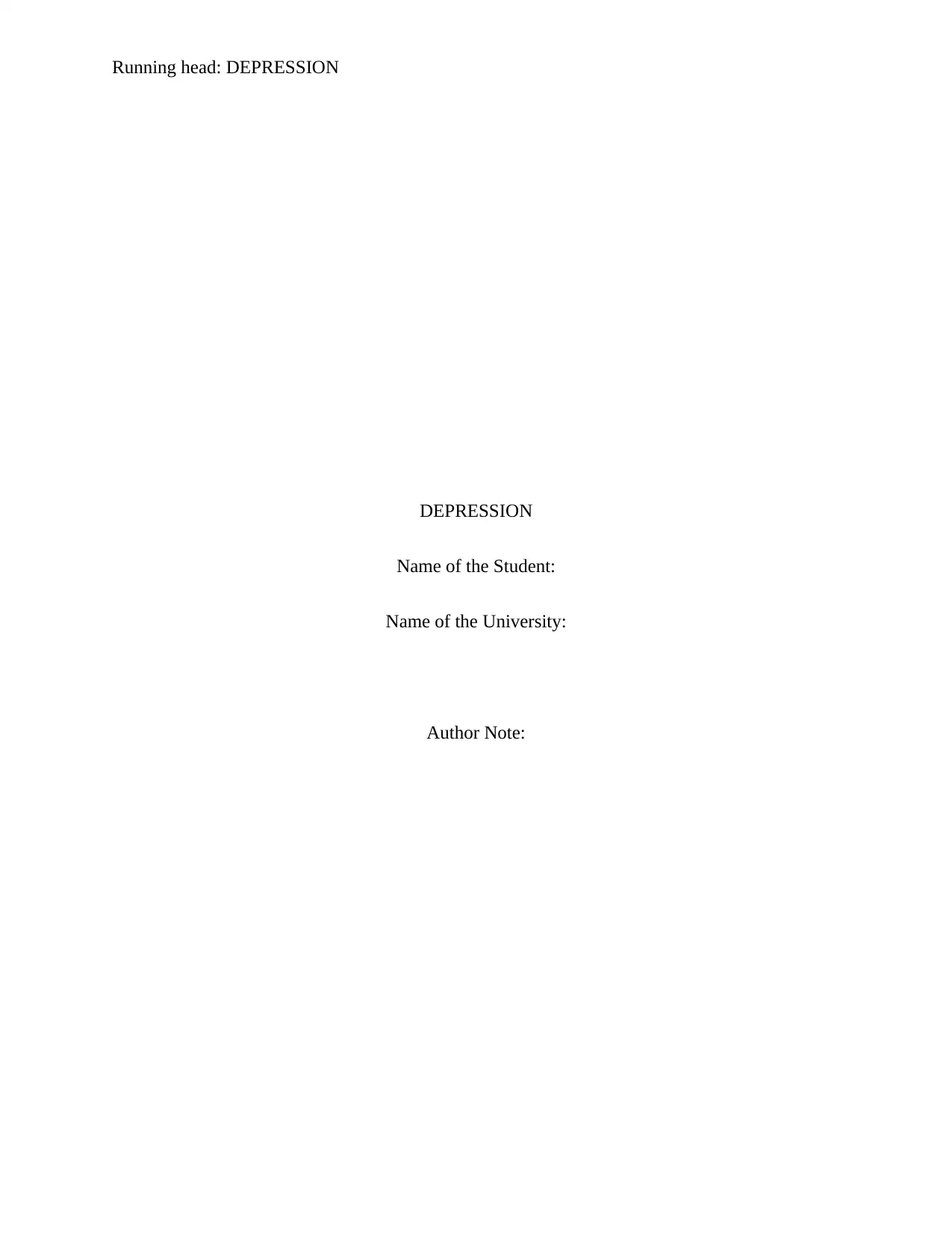
Running head: DEPRESSION
DEPRESSION
Name of the Student:
Name of the University:
Author Note:
DEPRESSION
Name of the Student:
Name of the University:
Author Note:
Paraphrase This Document
Need a fresh take? Get an instant paraphrase of this document with our AI Paraphraser
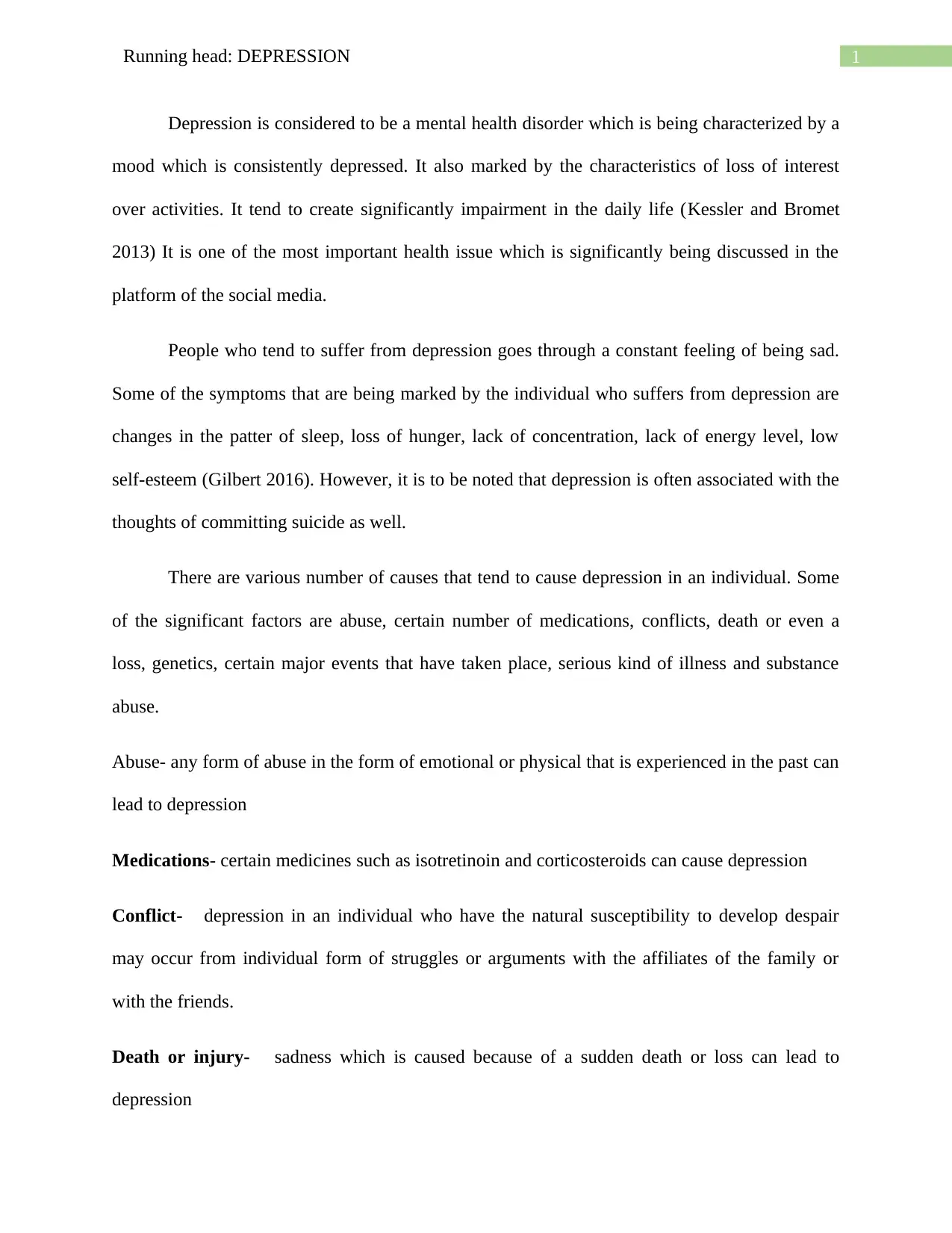
1Running head: DEPRESSION
Depression is considered to be a mental health disorder which is being characterized by a
mood which is consistently depressed. It also marked by the characteristics of loss of interest
over activities. It tend to create significantly impairment in the daily life (Kessler and Bromet
2013) It is one of the most important health issue which is significantly being discussed in the
platform of the social media.
People who tend to suffer from depression goes through a constant feeling of being sad.
Some of the symptoms that are being marked by the individual who suffers from depression are
changes in the patter of sleep, loss of hunger, lack of concentration, lack of energy level, low
self-esteem (Gilbert 2016). However, it is to be noted that depression is often associated with the
thoughts of committing suicide as well.
There are various number of causes that tend to cause depression in an individual. Some
of the significant factors are abuse, certain number of medications, conflicts, death or even a
loss, genetics, certain major events that have taken place, serious kind of illness and substance
abuse.
Abuse- any form of abuse in the form of emotional or physical that is experienced in the past can
lead to depression
Medications- certain medicines such as isotretinoin and corticosteroids can cause depression
Conflict- depression in an individual who have the natural susceptibility to develop despair
may occur from individual form of struggles or arguments with the affiliates of the family or
with the friends.
Death or injury- sadness which is caused because of a sudden death or loss can lead to
depression
Depression is considered to be a mental health disorder which is being characterized by a
mood which is consistently depressed. It also marked by the characteristics of loss of interest
over activities. It tend to create significantly impairment in the daily life (Kessler and Bromet
2013) It is one of the most important health issue which is significantly being discussed in the
platform of the social media.
People who tend to suffer from depression goes through a constant feeling of being sad.
Some of the symptoms that are being marked by the individual who suffers from depression are
changes in the patter of sleep, loss of hunger, lack of concentration, lack of energy level, low
self-esteem (Gilbert 2016). However, it is to be noted that depression is often associated with the
thoughts of committing suicide as well.
There are various number of causes that tend to cause depression in an individual. Some
of the significant factors are abuse, certain number of medications, conflicts, death or even a
loss, genetics, certain major events that have taken place, serious kind of illness and substance
abuse.
Abuse- any form of abuse in the form of emotional or physical that is experienced in the past can
lead to depression
Medications- certain medicines such as isotretinoin and corticosteroids can cause depression
Conflict- depression in an individual who have the natural susceptibility to develop despair
may occur from individual form of struggles or arguments with the affiliates of the family or
with the friends.
Death or injury- sadness which is caused because of a sudden death or loss can lead to
depression
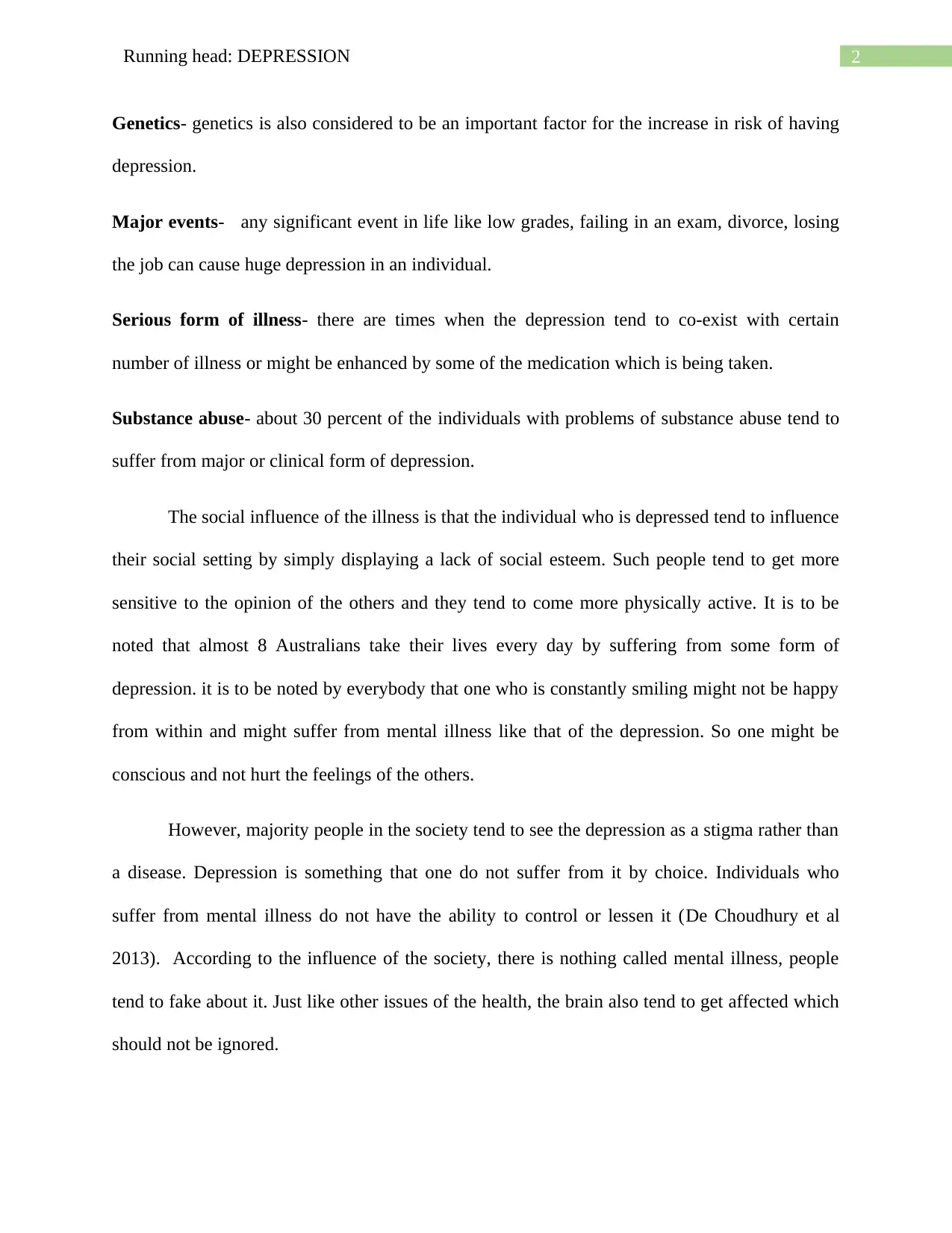
2Running head: DEPRESSION
Genetics- genetics is also considered to be an important factor for the increase in risk of having
depression.
Major events- any significant event in life like low grades, failing in an exam, divorce, losing
the job can cause huge depression in an individual.
Serious form of illness- there are times when the depression tend to co-exist with certain
number of illness or might be enhanced by some of the medication which is being taken.
Substance abuse- about 30 percent of the individuals with problems of substance abuse tend to
suffer from major or clinical form of depression.
The social influence of the illness is that the individual who is depressed tend to influence
their social setting by simply displaying a lack of social esteem. Such people tend to get more
sensitive to the opinion of the others and they tend to come more physically active. It is to be
noted that almost 8 Australians take their lives every day by suffering from some form of
depression. it is to be noted by everybody that one who is constantly smiling might not be happy
from within and might suffer from mental illness like that of the depression. So one might be
conscious and not hurt the feelings of the others.
However, majority people in the society tend to see the depression as a stigma rather than
a disease. Depression is something that one do not suffer from it by choice. Individuals who
suffer from mental illness do not have the ability to control or lessen it (De Choudhury et al
2013). According to the influence of the society, there is nothing called mental illness, people
tend to fake about it. Just like other issues of the health, the brain also tend to get affected which
should not be ignored.
Genetics- genetics is also considered to be an important factor for the increase in risk of having
depression.
Major events- any significant event in life like low grades, failing in an exam, divorce, losing
the job can cause huge depression in an individual.
Serious form of illness- there are times when the depression tend to co-exist with certain
number of illness or might be enhanced by some of the medication which is being taken.
Substance abuse- about 30 percent of the individuals with problems of substance abuse tend to
suffer from major or clinical form of depression.
The social influence of the illness is that the individual who is depressed tend to influence
their social setting by simply displaying a lack of social esteem. Such people tend to get more
sensitive to the opinion of the others and they tend to come more physically active. It is to be
noted that almost 8 Australians take their lives every day by suffering from some form of
depression. it is to be noted by everybody that one who is constantly smiling might not be happy
from within and might suffer from mental illness like that of the depression. So one might be
conscious and not hurt the feelings of the others.
However, majority people in the society tend to see the depression as a stigma rather than
a disease. Depression is something that one do not suffer from it by choice. Individuals who
suffer from mental illness do not have the ability to control or lessen it (De Choudhury et al
2013). According to the influence of the society, there is nothing called mental illness, people
tend to fake about it. Just like other issues of the health, the brain also tend to get affected which
should not be ignored.
⊘ This is a preview!⊘
Do you want full access?
Subscribe today to unlock all pages.

Trusted by 1+ million students worldwide
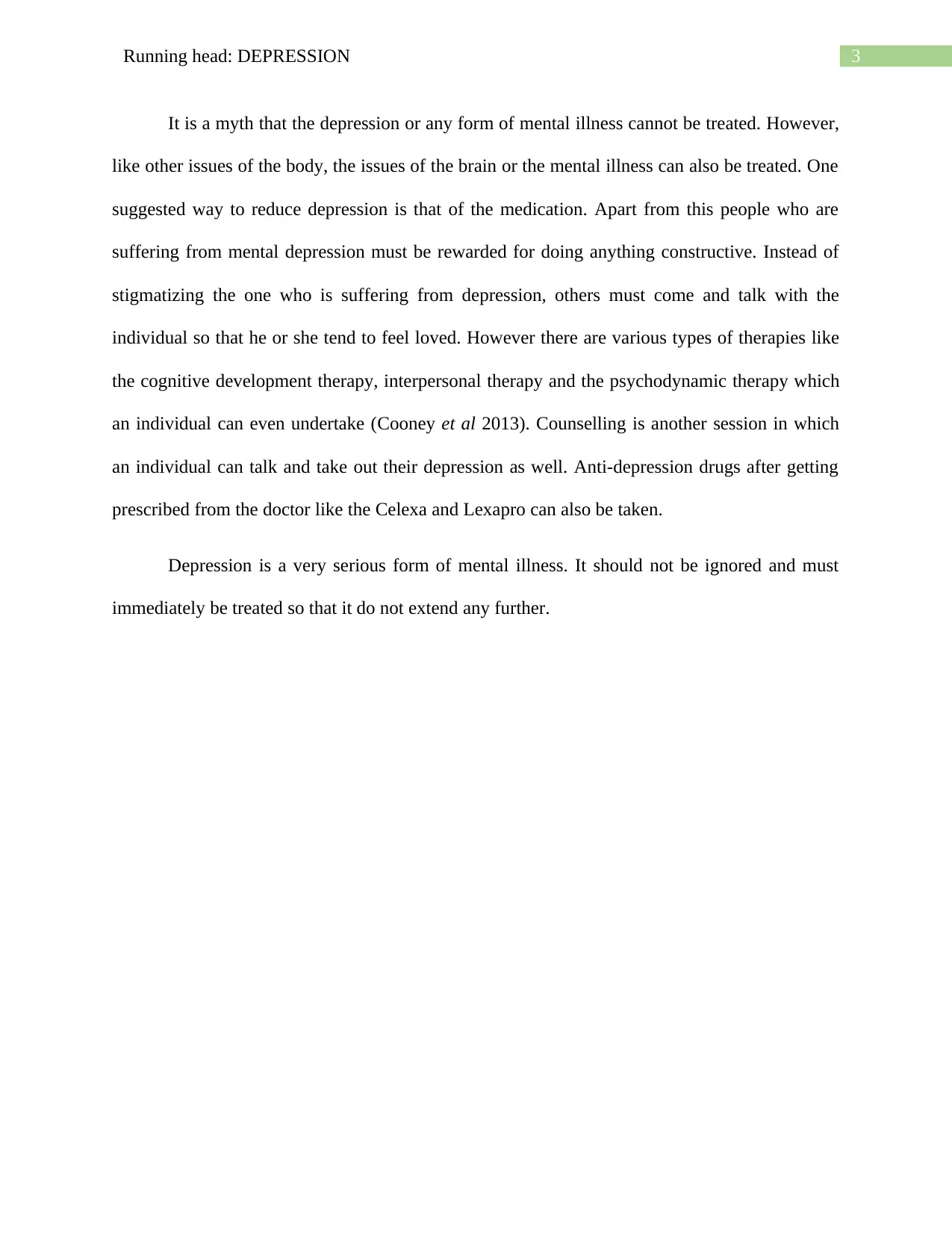
3Running head: DEPRESSION
It is a myth that the depression or any form of mental illness cannot be treated. However,
like other issues of the body, the issues of the brain or the mental illness can also be treated. One
suggested way to reduce depression is that of the medication. Apart from this people who are
suffering from mental depression must be rewarded for doing anything constructive. Instead of
stigmatizing the one who is suffering from depression, others must come and talk with the
individual so that he or she tend to feel loved. However there are various types of therapies like
the cognitive development therapy, interpersonal therapy and the psychodynamic therapy which
an individual can even undertake (Cooney et al 2013). Counselling is another session in which
an individual can talk and take out their depression as well. Anti-depression drugs after getting
prescribed from the doctor like the Celexa and Lexapro can also be taken.
Depression is a very serious form of mental illness. It should not be ignored and must
immediately be treated so that it do not extend any further.
It is a myth that the depression or any form of mental illness cannot be treated. However,
like other issues of the body, the issues of the brain or the mental illness can also be treated. One
suggested way to reduce depression is that of the medication. Apart from this people who are
suffering from mental depression must be rewarded for doing anything constructive. Instead of
stigmatizing the one who is suffering from depression, others must come and talk with the
individual so that he or she tend to feel loved. However there are various types of therapies like
the cognitive development therapy, interpersonal therapy and the psychodynamic therapy which
an individual can even undertake (Cooney et al 2013). Counselling is another session in which
an individual can talk and take out their depression as well. Anti-depression drugs after getting
prescribed from the doctor like the Celexa and Lexapro can also be taken.
Depression is a very serious form of mental illness. It should not be ignored and must
immediately be treated so that it do not extend any further.
Paraphrase This Document
Need a fresh take? Get an instant paraphrase of this document with our AI Paraphraser
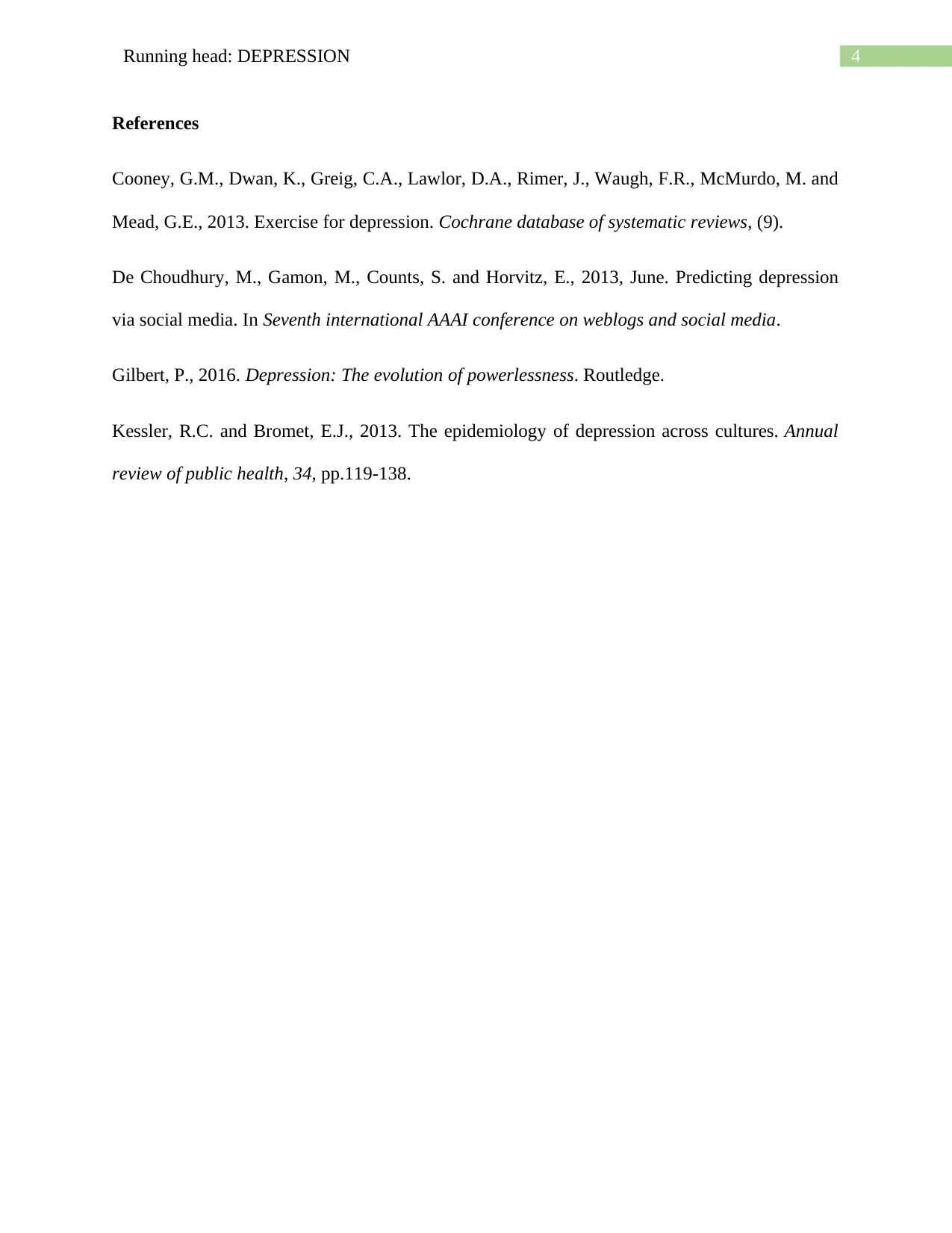
4Running head: DEPRESSION
References
Cooney, G.M., Dwan, K., Greig, C.A., Lawlor, D.A., Rimer, J., Waugh, F.R., McMurdo, M. and
Mead, G.E., 2013. Exercise for depression. Cochrane database of systematic reviews, (9).
De Choudhury, M., Gamon, M., Counts, S. and Horvitz, E., 2013, June. Predicting depression
via social media. In Seventh international AAAI conference on weblogs and social media.
Gilbert, P., 2016. Depression: The evolution of powerlessness. Routledge.
Kessler, R.C. and Bromet, E.J., 2013. The epidemiology of depression across cultures. Annual
review of public health, 34, pp.119-138.
References
Cooney, G.M., Dwan, K., Greig, C.A., Lawlor, D.A., Rimer, J., Waugh, F.R., McMurdo, M. and
Mead, G.E., 2013. Exercise for depression. Cochrane database of systematic reviews, (9).
De Choudhury, M., Gamon, M., Counts, S. and Horvitz, E., 2013, June. Predicting depression
via social media. In Seventh international AAAI conference on weblogs and social media.
Gilbert, P., 2016. Depression: The evolution of powerlessness. Routledge.
Kessler, R.C. and Bromet, E.J., 2013. The epidemiology of depression across cultures. Annual
review of public health, 34, pp.119-138.
1 out of 5
Related Documents
Your All-in-One AI-Powered Toolkit for Academic Success.
+13062052269
info@desklib.com
Available 24*7 on WhatsApp / Email
![[object Object]](/_next/static/media/star-bottom.7253800d.svg)
Unlock your academic potential
Copyright © 2020–2026 A2Z Services. All Rights Reserved. Developed and managed by ZUCOL.





